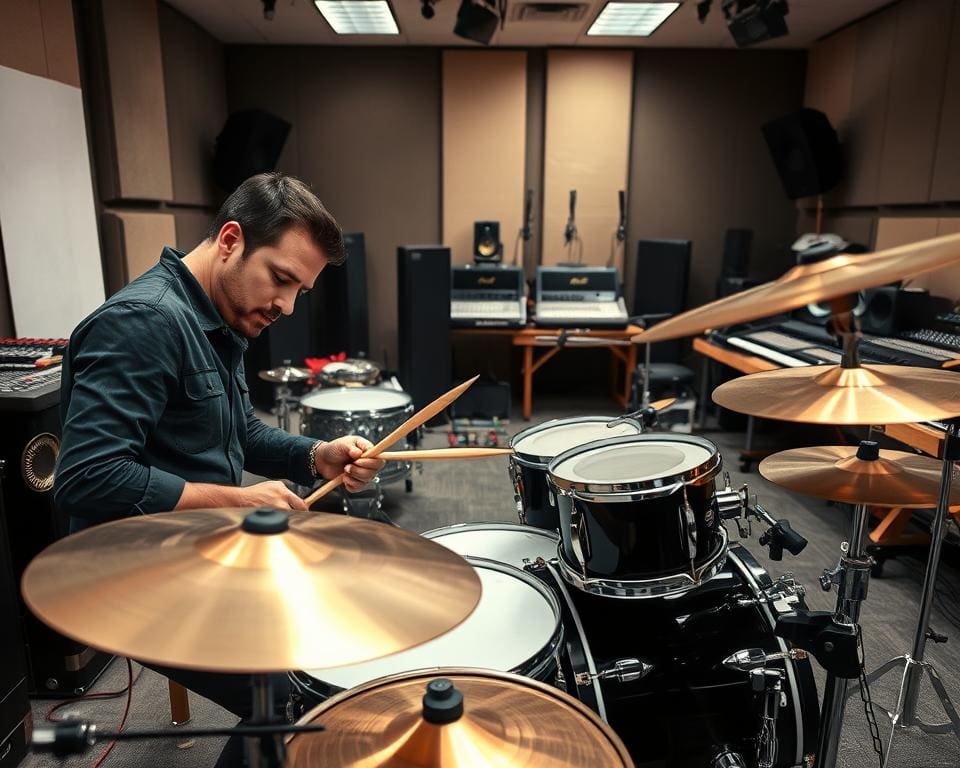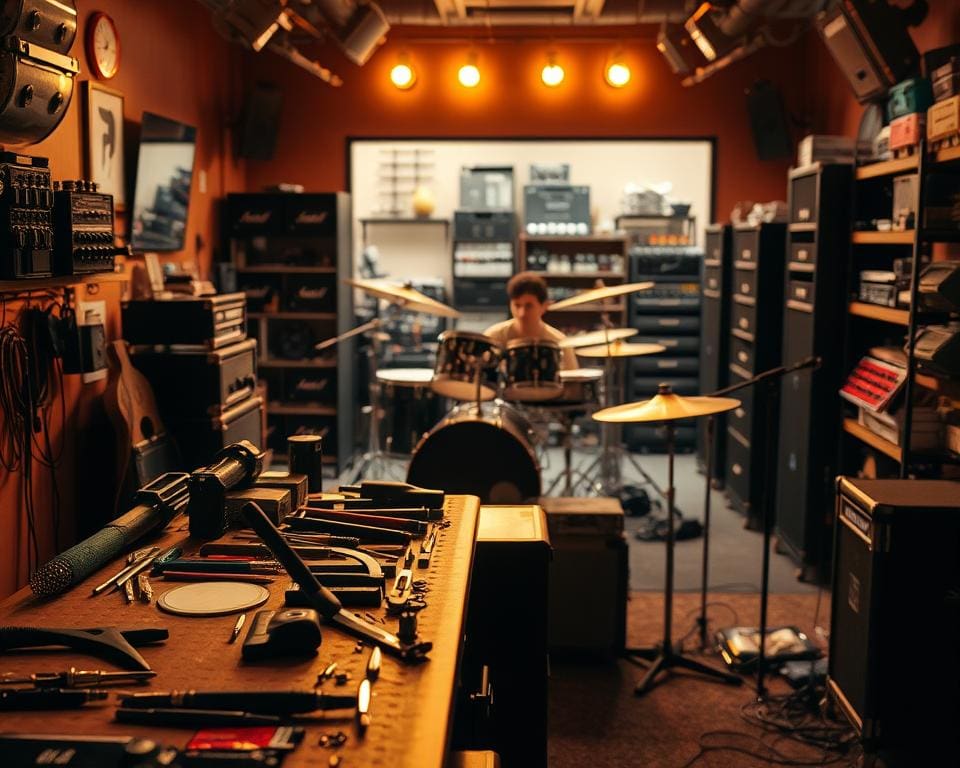Embarking on a drum technician career is an exhilarating journey that requires both passion and commitment. A drum tech plays a crucial role in the music industry, especially during live performances, ensuring that the rhythm section shines with precision and clarity. As we delve into the world of drum tech qualifications, this guide aims to equip you with the knowledge and skills needed to thrive in this vibrant field. Whether you’re a budding musician or someone passionate about sound engineering, understanding how to become a drum tech could be your gateway to an exciting and fulfilling profession.
Understanding the Role of a Drum Technician
The role of a drum technician is crucial in the world of music, particularly in the dynamic environment of live performances. Understanding the drum tech job duties can give aspiring technicians valuable insights into their responsibilities, as they play a vital role in the success of any musical event. With a blend of technical expertise and dedication, these professionals ensure that every performance is a hit.
What Does a Drum Tech Do?
A drum technician’s primary responsibilities revolve around the maintenance and preparation of drums. This includes:
- Setting up and dismantling drum kits for rehearsals and live performances.
- Tuning instruments to achieve the desired sound quality.
- Maintaining equipment by checking for any damages or wear.
- Coordinating with drummers to understand their specific requirements.
- Managing backstage logistics to ensure a seamless performance experience.
In the heart of the drum tech industry, these professionals are often the unsung heroes behind the scenes, meticulously handling each task to guarantee an impeccable performance.
Importance of a Drum Tech in Live Performances
The importance of a drum technician during live shows cannot be overstated. They significantly contribute to:
- Sound quality, ensuring that the drums blend well with the overall mix.
- Performance success by allowing artists to focus entirely on their musical delivery.
- Minimising technical glitches that could disrupt a performance.
By taking charge of the essential drum tech job duties, these professionals create an environment where musicians can thrive, leading to unforgettable performances that resonate with audiences.

How To Become A Drum Tech
Embarking on the journey to become a drum technician involves a blend of practical skills, educational support, and personal dedication. Understanding the essential drum tech qualifications can set the foundation for a successful career in this dynamic field. Aspiring technicians should focus not only on mastering technical aspects but also on obtaining recognised drum tech certification to stand out in the competitive music industry.
Essential Qualifications for Aspiring Drum Technicians
To begin, a good grounding in music theory and practice is vital. Familiarity with different musical genres and drumming styles enhances a technician’s capability to cater to various artists’ needs. Key drum tech qualifications include:
- A solid understanding of drum kit components and their functionalities.
- Basic knowledge of sound engineering and audio equipment.
- Practical experience with drum tuning and maintenance.
- Strong problem-solving skills, enabling quick fixes during live performances.
Certifications That Can Enhance Your Career Prospects
Acquiring a recognised drum tech certification plays a crucial role in career advancement. Such credentials demonstrate professional competence and commitment. Various institutions, including the Institute of Contemporary Music Performance, offer specific programmes aimed at drum technicians. These programmes cover essential skills, equipment handling, and troubleshooting techniques. Earning these certifications can significantly improve employment prospects and provide a competitive edge in the industry.
Developing Key Skills for Drum Tech Success
To excel as a drum technician, mastering a blend of technical and interpersonal skills is essential. Whether working during a live show or in a studio setting, these drum tech skills play a crucial role in ensuring that every performance runs smoothly.
Technical Skills Every Drum Tech Should Master
A strong foundation in technical skills is vital for any aspiring drum technician. Key areas of expertise include:
- Drum tuning and maintenance to achieve the perfect sound.
- Thorough understanding of different audio equipment used in performances.
- Proficiency in troubleshooting mechanical issues quickly and effectively.
- Knowledge of live sound mixing and how it affects the performance.
Interpersonal Skills for Effective Communication
Beyond the technical know-how, interpersonal skills are equally significant. Communicating clearly and effectively with musicians, sound engineers, and crew is critical in the fast-paced live music environment. Key aspects include:
- Active listening to understand the needs and preferences of the artists.
- Confidence in conveying technical information to non-technical members of the team.
- Collaboration and teamwork to create an optimal performance atmosphere.
- Adaptability to handle unexpected changes and last-minute requests.
Educational Pathways and Training Programs
Embarking on a career as a drum technician requires a solid educational foundation coupled with practical experience. Various educational pathways exist to equip aspiring drum techs with the necessary skills and knowledge. Pursuing these drum tech training options can significantly enhance your professional prospects.
Recommended Training Resources and Programmes
Several training resources and programmes are available to those considering a career in drum tech. These options may include:
- Workshops conducted by industry professionals, providing hands-on experience and insights.
- Online courses from reputable music schools, focusing on both technical skills and equipment maintenance.
- Masterclasses that feature established drum techs sharing their expertise and best practices.
- Coding and electronics courses which help to understand the technical side of modern drum kits and their setups.
Internships and Apprenticeships in the Drum Tech Industry
Gaining real-world experience through internships and apprenticeships presents an invaluable opportunity to learn the intricacies of the drum tech industry. Many successful drum technicians credit their hands-on experiences for their skills and industry insight. Engaging in these placements often provides:
- Direct mentorship from seasoned professionals, honing both technical and interpersonal skills.
- Networking opportunities to connect with other industry experts and fellow aspiring techs.
- Exposure to live environments, allowing for the application of knowledge in real-time situations.
Career Opportunities and Industry Insights
The landscape of a drum technician career is as vibrant and dynamic as the music industry itself. As live performances continue to thrive, the demand for skilled drum technicians remains high. They play an essential role in ensuring that artists deliver seamless performances, allowing them to focus on their artistry while the tech handles equipment and sound quality. From touring with established bands to setting up for local gigs, opportunities abound for those passionate about drumming and sound engineering.
As the industry evolves, so do the roles available to drum techs. Many professionals find themselves not only touring with musicians but also working in recording studios, collaborating with diverse artists across genres. This shift underscores the importance of versatility, as a successful drum technician can navigate between live settings and studio environments. Understanding industry trends, such as the integration of technology and evolving sound preferences, can enhance one’s calling in this vibrant field.
Salary ranges for drum technicians can vary significantly, influenced by factors such as experience, the scale of the project, and geographical location. Building a solid reputation and a network of industry contacts is pivotal for career advancement. Engaging with established professionals through workshops, events, or online forums can provide insights into the challenges and rewards of this profession. Becoming a drum tech guide is essential not just for mastering technical skills, but also for navigating opportunities and securing a fulfilling career in the music industry.









